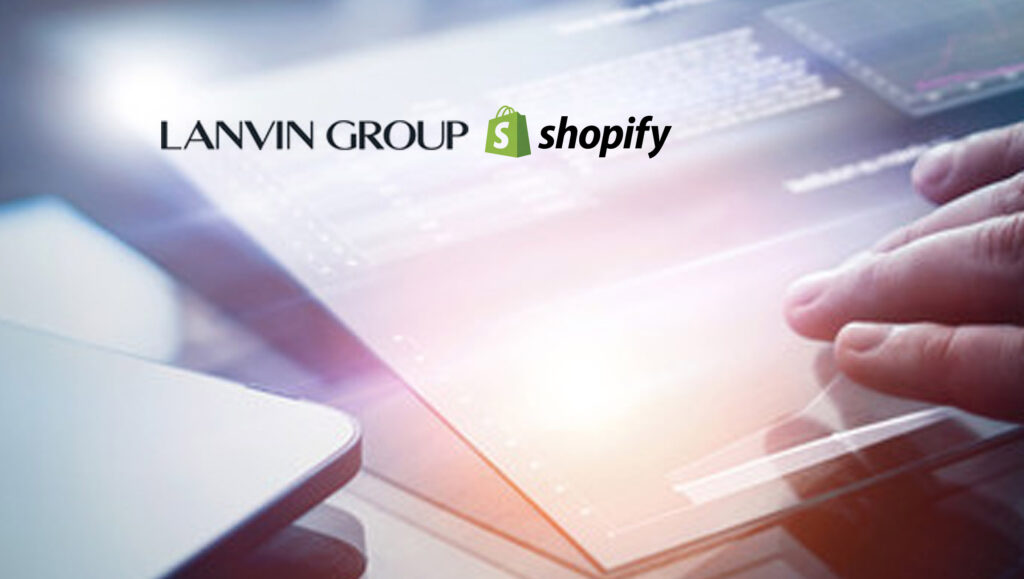Global luxury fashion group harnessing the power of Shopify technologies to build a disruptive digital platform
Lanvin Group, a global luxury fashion group, today announced that it has entered into a commercial agreement with Shopify, a leading provider of essential internet infrastructure for e-commerce, that will allow it to build a North American digital platform powered by Shopify’s technologies.
From H2 2022, Lanvin and Sergio Rossi will become the first of the Group’s luxury brands to transition onto the digital platform in the North American market, allowing them to unlock new growth opportunities with market-leading digital capabilities in the world’s largest luxury fashion market.
Read More: SalesTechStar Interview with Ariel Hitron, CEO at Second Nature
The new digital platform powered by Shopify’s high performing and trusted technologies will allow the brands to focus on what matters the most – products and customers – and to continue their expansion with the assurance and support of a robust commerce engine in the years to come. This will form an important part of the Group’s ongoing efforts to provide best-in-class customer experience with dedicated merchandise and content, as well as optimized and localized omni-channel shopping services.
Shopify’s highly modular and scalable solutions offer great potential for the Group’s other existing and any newly-acquired luxury brands to centralize their e-commerce functions on a shared platform, creating synergies across the portfolio, while still maintaining individual brand’s unique interfaces and databases. The Group will adopt Shopify’s agile and user-friendly digital solutions to further enhance the increasingly important digital experience for customers, and benefit from Shopify’s extensive app-based ecosystem in business process optimization and digital acceleration as it continues to expand globally through retail footprint expansion, e-commerce channel activation and category expansion.
Ms. Joann Cheng, Chairman and CEO of Lanvin Group, said: “As an innovation-driven luxury fashion group, we strive to usher in the future of luxury. Shopify has been at the forefront of innovation, working with some of the most successful businesses to transform e-commerce for merchants and consumers globally. The launch of our new Shopify-powered platform is a testament to our differentiated strategy to deliver high growth by leveraging the newest technologies, working with best-in-class partners, and speaking to the consumers of tomorrow. Our legacy-light and digital-native model allows us to integrate Shopify’s disruptive technologies across our portfolio of heritage brands. Thanks to the strengthened e-commerce capabilities brought by Shopify, Lanvin Group is now even better equipped to capture the significant growth opportunities we have identified in North America, the world’s largest luxury market.”
Read More: Edge Solutions Will Continue to Receive Strong Investment…
Harley Finkelstein, President of Shopify Inc., said: “At Shopify, we enable the world’s best brands to seamlessly reach their customers and connect with new audiences. We are thrilled that Lanvin, an iconic, 130-year old brand, has chosen Shopify to power its ecommerce business as it enhances its digital platform in North America. With our world-class technology, we know this launch will enable Lanvin to pursue endless possibilities and growth opportunities.”
Lanvin Group recently announced that it has entered into a definitive business combination agreement with Primavera Capital Acquisition Corporation that is expected to list Lanvin Group on the New York Stock Exchange.
Note to Editor
According to Bain-Altagamma Luxury Goods Worldwide Market Study (Fall 2021-20th), online channel is on track to becoming the number-one distribution channel by 2025, accounting for approximately 30% of the personal luxury goods market. The online personal luxury goods market almost doubled its size between 2019 to 2021, representing a €62 billion market on its own. Websites devoted to a single brand gained ground on other types of online platforms and made up 40% of the online segment in 2021, up from 30% in 2019.





















